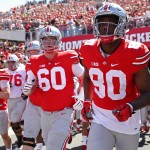Game Preview: Indiana at Ohio State
Brandon Zimmerman via our good friends at Buckeye Battle Cry
Visit their fantastic blog and read the full article (and so much more) here
Indiana Hoosiers @ Ohio State Buckeyes – Ohio Stadium 3:30 pm ET
Now in his sixth season as head coach, Kevin Wilson has only managed a 23-42 record with the Hoosiers but against the Buckeyes he always has his team ready to play. Much like the Boilermakers were at one point in the late 2000’s, the Hoosiers have become that thorn in the side of the Buckeyes under Wilson.
In 2011, the Hoosiers finished the season 1-11 but Ohio State needed a 20 yard TD run by Braxton Miller with nine seconds left in the third quarter to go ahead for good as they won 34-20.
In 2012, the Hoosiers limped to a 4-8 record but that did not stop them from taking the Buckeyes to the wire as the Hoosiers scored 15 points in under two minutes to barely lose 52-49.
In 2013, things were a little more normal as the Buckeyes jumped out to a 42-0 lead before backing off the gas pedal and winning 42-14.
In 2014, the Hoosiers finished 5-7 and led the Buckeyes 20-14 with a little over two minutes left in the third quarter. This was the game where Jalin Marshall exploded onto the scene and scored four straight touchdowns to give the Buckeyes the 42-27 win.
In 2015, the Hoosiers would finish the year 6-7 but they once again played the Buckeyes tough. As they did in 2014, the Hoosiers actually led the Buckeyes with a little over one minute left in the third quarter. It took two long Zeke touchdown runs and a Michael Thomas touchdown grab in the final 16 minutes of gameplay to hold off the Hoosiers 34-27.
No matter the records, when these two teams meet it is usually a good game.
The Intangibles
TV: ESPN (Bob Wischusen/Brock Huard/Allison Williams)
Radio:
Ohio State IMG Radio Network/97.1 WBNS (Paul Keels/Jim Lachey/Matt Andrews)
Online:
WatchESPN I
97.1 WBNS (Audio)
Social Media:
@OhioStAthletics I
@HoosierFootball
Series Record: 71-12-5 (Last Meeting: OSU 34 – IU 27, Oct 3, 2015)
Previewing the Hoosiers
The Hoosiers are riding high off of their stunning victory against the Michigan State Spartans. They come into this game winning three of their first four games. Indiana is scoring 29 points per game and they are giving up 21.8 points per game.
Offensively, the Hoosiers appear to be more balanced than they have been in years past. They are throwing for 320.75 yards per game and rushing for 176 yards per game. Defensively, the Hoosiers have stepped up more than in years past as they are only giving up 373 yards per game (233.5 passing/139.5 rushing).
At quarterback will be redshirt junior Richard Lagow (6’6”, 237 lbs) who will be making his fourth career start for the Hoosiers. On the season, Lagow has thrown for 1278 yards (319.5 per game) and nine touchdowns. He has also thrown for six interceptions through four games but five of those came in one game against Wake Forest.

MIAMI, FL – SEPTEMBER 01: Richard Lagow #21 of the Indiana Hoosiers smiles during the first half of the game against the FIU Panthers at FIU Stadium on September 1, 2016 in Miami, Florida. (Photo by Rob Foldy/Getty Images)
Those interception numbers do not appear to be ideal against a ball-hawking secondary. Against the mighty Spartans, Lagow played a great game as he threw for 276 yards and three total touchdowns. Lagow will have three very talented wide receivers to disperse the ball to.
One of his main targets throwing the ball will be sophomore Nick Westbrook (6’3”, 215 lbs) who has caught 18 balls for 370 yards and four touchdowns on the young season. As a freshman, Westbrook only caught six balls with one being for a touchdown.
Starting alongside of Westbrook at wide receiver is the ever dangerous senior Ricky Jones (5’10”, 185 lbs) who has 16 catches on the season for 350 yards and one touchdown. For his career, Jones has 74 catches for 1,316 yards but only six touchdowns.
Next to Westbrook and Jones will be senior Mitchell Paige (5’7”, 180 lbs) who has 18 catches for 217 yards and one touchdown on the season. In his second year of starting, Paige has 75 catches for 901 yards and seven touchdowns for his career.
At running back will be junior Devine Redding (5’10”, 208 lbs) who is very experienced even though he backed up Jordan Howard last season. Due to injuries to Howard, Redding played a lot last year and rushed for 1,012 yards. Against Ohio State in 2015, Redding was the primary ball carrier and had 30 rushes for 45 yards but did manage two touchdowns. So far this season, Redding has accumulated 413 rushing yards (103.25 per game) with no touchdowns.
On the defensive side of the ball, the Hoosiers start eight upperclassmen and appear to be better than they were last year. As I mentioned earlier, they are giving up 373 yards per game and 21.8 points per game in 2016. Last year, the Hoosiers gave up 509.4 yards and 37.6 points per game but they have not yet met the meat of their schedule.
The starting defensive line has struggled from a statistical standpoint. Redshirt junior Nate Hoff (6’2’, 305 lbs) has the most tackles with 12 from the defensive tackle position. He is also tied for second on the team with one sack. He will be joined by defensive ends Greg Gooch (6’2”, 260lbs), Jacob Robinson (6’4”, 285 lbs), and defensive tackle Ralph Green III (6’5”, 305 lbs) in an effort to slow down the Buckeye rushing attack.

BLOOMINGTON, IN – OCTOBER 1: After making a decisive defensive stop in overtime, Tegray Scales #8 and members the Indiana Hoosiers defense celebrate as they run off the field during the game against the Michigan State Spartans at Memorial Stadium on October 1, 2016 in Bloomington, Indiana. Indiana defeated Michigan State 24-21. (Photo by Michael Hickey/Getty Images)
In the 4-2-5 alignment, the Hoosiers turn to junior Tegray Scales (6’0”, 230 lbs) and redshirt junior Marcus Oliver (6’1”, 240 lbs) to man the linebacker positions. Scales has been the most productive of the duo leading the Hoosiers in tackles (35), tackles-for-loss (5.5), and sacks (2).
In the secondary, the biggest playmaker in the early part of the season has been true freshman Marcelino Ball (6’0”, 210 lbs) who plays the HUSKY position for the defense. On the season, he is third on the team with 27 tackles and tied for the team lead with one interception. He will be joined in the defensive backfield by senior cornerbacks Rashard Fant (5’10”, 175 lbs), Ben Bach (6’1”, 197 lbs), sophomore safety Jonathan Crawford (6’2”, 198 lbs), and junior safety Tony Fields (5’11”, 203 lbs).
Previewing the Buckeyes
The season could not have started off any better for Ohio State. They enter their fifth game and are first in the B1G in scoring offense (57 ppg), rushing offense (332 ypg), total offense (576.3 ypg), scoring defense (9.3 ppg), and total defense (235.5 ypg).
They are led by three potential Heisman candidates on offense (Barrett, Weber, and Samuel) and still manage to spread the ball around to all of their playmakers as 11 different Buckeyes have scored touchdowns. It is really hard to not drink the Kool-Aid of the 2016 Ohio State Buckeyes.
At quarterback, the Buckeyes have leaned heavily on the reliable work of redshirt junior Joe Thomas Barrett. The Captain of the Buckeye Death Ship has provided 273.3 yards of total offense per game while combining for 17 touchdowns. All of this has been completed with him only playing one full game as he was pulled early in three of those games due to the lead.
At running back the Buckeyes have turned to redshirt freshman Mike Weber to carry the load and replace Ezekiel Elliott and he has not failed them. Weber is second in the B1G with 495 yards and is averaging an astounding 7.28 yards per carry. He is averaging 17 attempts and 123 yards per game.
To help relieve the burden on Weber, the Buckeyes have relied heavily on junior Curtis Samuel and senior Dontre Wilson out of the H-Back position. Samuel leads the team with 168.3 total yards per game as he is a severe mismatch whether he is lined up in the backfield or in the slot. Samuel has 328 rushing yards, 345 receiving yards, and five touchdowns on the young season.
Wilson has really came into his own this year after battling injuries for the past two years. Backing up Samuel and Weber, while taking on punt return duties, Wilson is combining for 94 yards per game of total offense which is third on the team. Combine those yards with his four touchdowns and we are finally getting to see how dynamic Wilson can be.

COLUMBUS, OH – OCTOBER 1: Dontre Wilson #2 of the Ohio State Buckeyes is dropped in the backfield by Kiy Hester #2 of the Rutgers Scarlet Knights in the first quarter at Ohio Stadium on October 1, 2016 in Columbus, Ohio. (Photo by Jamie Sabau/Getty Images)
On the outside, the Buckeyes have started redshirt sophomores Noah Brown and Parris Campbell each game. They have combined for 16 catches for 206 yards and six touchdowns. While those numbers don’t appear to be all that impressive, the Buckeyes have rotated out their receivers on a consistent basis as 15 different players have caught a ball. Expect to see a lot more of those two as we enter the heart of B1G play.
One of the strengths of the Buckeye defense has been the defensive line which has been led by a quartet of defensive ends; Sam Hubbard (r-So.), Tyquan Lewis (Jr.), Jalyn Holmes (Jr.), and Nick Bosa (Fr.). These four have combined for 39 tackles, 10.5 tackles-for-loss, and 6.5 sacks through the first four games of the season. They are joined on the defensive line by starting tackles junior Michael Hill (8 tackles) and Dre’Mont Jones (8 tackles). Nipping at their heels is redshirt freshman Robert Landers who has 8 tackles, one sack, and a team leading five tackles-for-loss as a back-up defensive end.
At linebacker, the Buckeyes are led by the best middle linebacker in the nation, junior Raekwon McMillan. In 2016, McMillan leads the Buckeyes with 27 tackles. He will be flanked by redshirt junior Chris Worley (20 tackles) and sophomore Jerome Baker (15 tackles). If healthy, junior Dante Booker may regain his spot over Baker. Booker has missed the last two games due to a knee injury.
The secondary has been absolutely lights out this year. Three cornerbacks rotate pretty frequently in an effort to keep them all fresh. Redshirt junior Gareon Conley and redshirt sophomore Marshon Lattimore are the starters and they have combined for 17 tackles. Lattimore is tied for the team lead with three interceptions and leads the team with four pass break-ups. Conley has one interception and two pass break-ups as teams don’t throw his way very often. Keeping them fresh is sophomore Denzel Ward who has not missed a beat when he plays. For the year, Ward has six tackles and three pass break-ups.
At safety is the sensational redshirt sophomore Malik Hooker and the dependable junior Damon Webb. Hooker has taken the nation by storm in the early part of the season as he has 19 tackles, three interceptions, 1.5 tackles-for-loss, and two pass break-ups. As a former cornerback, Webb is counted on to play man coverage across the middle. So far, Webb has played this incredibly tough position very well as he has 13 tackles on the season and two pass break-ups.
Three Key Matchups
- Indiana Offense vs. Ohio State Defense: The Hoosiers have always had a pretty good offense but it has always been a pretty pass-heavy offense. This year’s version of the Hoosiers features the ability to hurt you on the ground or through the air. Outside of Oklahoma, this is the most balanced offense they Silver Bullets have faced all year. Lagow is on pace to throw for 3,834 yards and Redding is on pace to rush for 1,239 yards per game. Will they be able to stop both the throws across the middle and Redding pounding the ball?
- Mike Weber/Curtis Samuel vs. Indiana Defensive Line: The Hoosiers sold out last week in an effort to stop the talented duo of Gerald Holmes and LJ Scott of Michigan State. The result was the Hoosiers holding them to 89 yards on 20 carries. As good as Barrett is, the Buckeyes average 332 rushing yards per game so expect the Hoosiers to focus on stopping the run again. Will Weber and Samuel be able to keep pressure off of Barrett and the passing game?
- Kevin Wilson vs. Urban Meyer: As I spoke about at the beginning, Wilson and his team seem to have Coach Meyers number. Sure they never win but they cause Ohio State some severe heartburn. Just as the Hoosiers did last week against the Spartans, expect Jones and his staff to pull out trick plays like they did when Mitchell Paige threw back to Richard Lagow for the touchdown.
Prediction
I know we are trying to buildup Indiana as a tough game but let’s be real. This is a team that lost to Wake Forest and struggled against Florida International and Ball State. I would be a lot more worried with Wisconsin looming next week but Indiana beating Michigan State took any of those “trap game” worries away. There is no chance this team gets caught looking forward after watching the Hoosiers take down Sparty. Final Score: OSU 66 – IU 9.
The post
Game Preview: Indiana at Ohio State appeared first on
The Buckeye Battle Cry: Ohio State News and Commentary.
Continue reading...






























